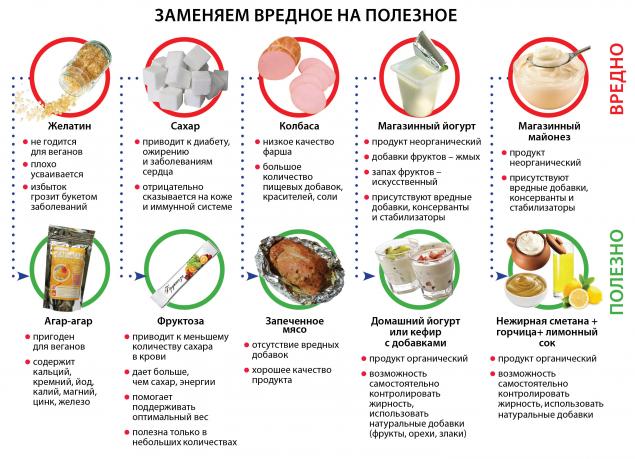146
Diet for allergic dermatitis
An allergic reaction of the body can occur in response to the influence of various factors. One of the fundamental points of treatment is a change in diet. Diet for allergic dermatitis helps relieve acute symptoms and cleanse the skin from allergic rashes.
Information on the disease
In allergic dermatitis, the immune system reacts acutely to irritants in contact with the skin. An allergic reaction can cause some medicines, perfumes, cosmetics, metals, paints, polymers (artificial, natural), industrial products, plants, etc. With this pathology, the allergen, in contact with the skin, affects the entire body, increases sensitivity to the effects of irritants. The cause of the disease, as a rule, can be identified far from immediately - several days may pass between contact with the allergen and the manifestation of the clinical picture.
The main symptoms of dermatitis: redness and swelling of the body area, the appearance of a rash (part of the microvesicles bursts, which provokes the formation of wet areas). The spots have no clear outlines. With subsequent exposure to the allergen, dermatitis can develop into eczema. In order not to aggravate the problems, the patient is strongly advised to review the diet and exclude possible food allergens.

Nutrition recommendations
The diet prescribed for allergic dermatitis excludes well-known allergens that can provoke an acute reaction of the immune system. If possible, you should visit the laboratory to identify the most dangerous individual allergens.
During the diet, you should abandon the use of the following products:
Diet reduces the share of the following products:
It is important to remember that fatty foods and alcohol accelerate the penetration of allergens into the blood - they should be excluded. When cooking, you should use the most fresh organic products. The cereals are recommended to be pre-soaked in cold water. When cooking meat, the first broth should be drained. Salt and sugar should be reduced by half. You can not drink tap water - with allergic dermatitis, the quality of the fluid becomes especially important (filtered or melted water is a priority).
The basis of the diet is:
published
Source: updiet.info/
Information on the disease
In allergic dermatitis, the immune system reacts acutely to irritants in contact with the skin. An allergic reaction can cause some medicines, perfumes, cosmetics, metals, paints, polymers (artificial, natural), industrial products, plants, etc. With this pathology, the allergen, in contact with the skin, affects the entire body, increases sensitivity to the effects of irritants. The cause of the disease, as a rule, can be identified far from immediately - several days may pass between contact with the allergen and the manifestation of the clinical picture.
The main symptoms of dermatitis: redness and swelling of the body area, the appearance of a rash (part of the microvesicles bursts, which provokes the formation of wet areas). The spots have no clear outlines. With subsequent exposure to the allergen, dermatitis can develop into eczema. In order not to aggravate the problems, the patient is strongly advised to review the diet and exclude possible food allergens.

Nutrition recommendations
The diet prescribed for allergic dermatitis excludes well-known allergens that can provoke an acute reaction of the immune system. If possible, you should visit the laboratory to identify the most dangerous individual allergens.
During the diet, you should abandon the use of the following products:
- Cow's milk
- Certain types of fish
- fish
- Soy products
- Coffee, chocolate, cocoa.
- Fungi
- Tomatoes, beets, carrots and other brightly colored vegetables
- honey
- Nuts
- Eggs.
- Rye and wheat-based products
- Fruits of orange, red, yellow color (garnet, lemon, orange, grapefruit, persimmon, pineapple, strawberries, etc.)
- Smoking
- Products containing dyes, emulsifiers, preservatives
- Canned food
- Fatty broths
- Fried, spicy and salty dishes
- Fatty meat products
Diet reduces the share of the following products:
- Green Bulgarian pepper
- Green peas
- Beans
- Buckwheat.
- Corn, potatoes, pumpkin
- Cranberries, apricots, peaches, bananas
It is important to remember that fatty foods and alcohol accelerate the penetration of allergens into the blood - they should be excluded. When cooking, you should use the most fresh organic products. The cereals are recommended to be pre-soaked in cold water. When cooking meat, the first broth should be drained. Salt and sugar should be reduced by half. You can not drink tap water - with allergic dermatitis, the quality of the fluid becomes especially important (filtered or melted water is a priority).
The basis of the diet is:
- Chicken fillet (without skin)
- Lean beef.
- Low fat pork
- Apples (green and yellow), plums, watermelons, pears, zucchini, gooseberry, white cherries and currants, and other lightly colored fruits
- Sunflower and olive oil
- Fresh dairy products
- Cereals (rice, oatmeal, pearl)
- Green tea
published
Source: updiet.info/























